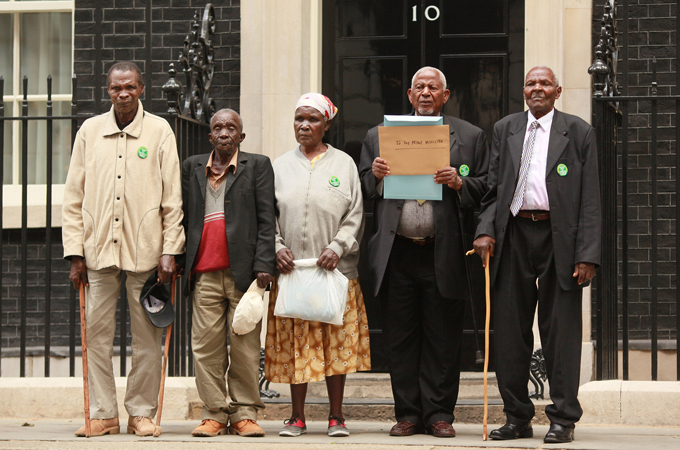Kenyan rebels seek justice for UK ‘torture’
New documents revealed in London court case, shedding light onn ‘atrocities’ committed by British colonialists.
![Kenya Mau Mau trial in UK [GALLO/GETTY]](/wp-content/uploads/2011/04/201146214328788884_20.jpeg?resize=770%2C513&quality=80)
 |
| Former Mau Mau rebels say they were tortured by British forces during Kenya’s fight for independence [GALLO/GETTY] |
It’s a case involving allegations of torture, long-hidden government records, and a successful anti-colonial struggle.
Four Kenyans, including two who say they were castrated, sexually abused and severely beaten in a British-run prison camp during the Mau Mau rebellion in the 1950s and 1960s, have launched a lawsuit against the UK government. Legal proceedings begin in London on Thursday.
“I don’t think many people are aware of the idea that the British government was involved in the systematic torture and abuse of people fighting for their freedom,” said Martyn Day, a senior partner at Leigh Day & Co, the law firm representing aging Kenyan activists.
Criticisms of colonialism are nothing new. The case, however, is important because it has contemporary repercussions for how governments deal with sensitive documents from past eras.
Setting the record straight
The historical research of David Anderson, a specialist of African politics at Oxford University, has played a crucial role in the case.
During archival searches in Kenya and the UK during the 1990s, he found the British had “deliberately” taken documents out of Kenya before the country declared independence in 1963.
“It was a conspiracy to conceal things from the Kenyan government,” Anderson told Al Jazeera, adding that British law, specifically the Public Records Act of 1958, prohibits this sort of behavior.
Anderson interviewed a number of senior former colonial officials to ask whether documents were removed from Kenya. “They shrugged in kind of a cagey way and said ‘what do you think?’ You don’t leave your dirty laundry for the new house dwellers to find it, you take it with you.”
Historians estimate that at least 90,000 Kenyans were executed or tortured between 1952 and 1960, with tens of thousands more detained under brutal conditions as they fought for independence. Mau Mau rebels are also blamed for violent attacks on white farmers and colonial authorities.
“The experience of these claimants was not unique,” said Anderson, who has written several books about Kenya. “I would go as far to say that torture was systemic, it was part of a system of detention and abuse, organised in a pragmatic way.”
Lawyers for the UK government will argue the case should be thrown out of court because the events in question happened decades ago and are difficult to prove today. “That will be in big issue heard by the court in the next few days,” said Day, the plaintiff’s lawyer.
“They [lawyers for the government] also say we are suing the wrong people; they say we should be suing the Kenyan government,” Day told Al Jazeera.
The grandfather of Barack Obama, the US president, is among those who were detained and abused, the UK Guardian newspaper reported.
‘Cover-up’ or bungle-up?
Records from the UK Foreign Office, discovered as part of the court case, could include information on torture.
In November 2010, in the lead up to the case, Anderson issued a statement to the court, detailing why he believed records existed.
The judge took the historian’s letter seriously and instructed the Foreign Office to find the documents which they previously said did not exist.
“Within 48 hours, they [Foreign Office officials] had the documents,” said Anderson. Officials later admitted they made a mistake in not locating the documents earlier. “I am not sure if I entirely swallow that explanation,” Anderson said. “I think this was a conspiracy that became a cock-up.” He stressed that the contents of the secret files remain unknown.
Martyn Day, the lawyer, does not believe the government made a “deliberate attempt” to conceal files, blaming “incompetence” instead.
Lord Howell, the UK foreign minister, told the House of Lords: “As a result of searches in connection with a legal case brought by Kenyan Mau Mau veterans against the Foreign and Commonwealth Office, the FCO has decided to regularise the position of the 2,000 boxes of files it currently holds.”
The UK Foreign Office currently holds more some 8,800 files, each containing large volumes of information from 37 former British colonial administrations including Nigeria, Palestine, Jamaica, Singapore and Uganda. The documents had been retained because they were judged to be too sensitive.
Many of the files are being kept secret because they could be embarrassing to former colonial officials or the British government itself, said Anderson. “That embarrassment might amount to the concealment of criminal activities,” the Oxford University historian said, stressing that the contents of the files remain unknown.
Kenyan plaintiffs are not seeking millions of dollars in damages or “what their injuries would be valued in a normal sense in the UK today,” said Day. “They want an apology and a welfare fund to let them live with dignity in their final years.”
When the UK case begins Thursday, the International Criminal Court in The Hague will begin hearings on a separate war crimes case, probing widespread ethnic violence in Kenya, following disputed elections in 2007.
But recent violence should be viewed as a separate matter from past incidences, Anderson said.
And, even if the case gets thrown out of court, the proceedings have shed light on secrecy surrounding thousands of colonial era records. Even if decades have passed since the alleged torture and castration of Kenyan rebels, Anderson believes the case represents a fundamental issue of justice. “There is no statute of limitations in war crimes and human rights cases,” the historian case. “The fact that it happened is all that matters.”